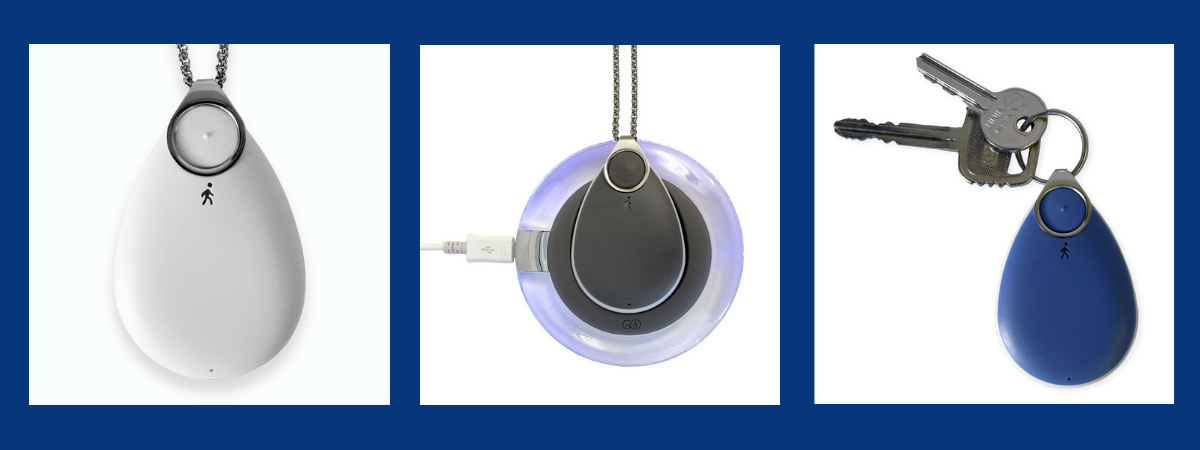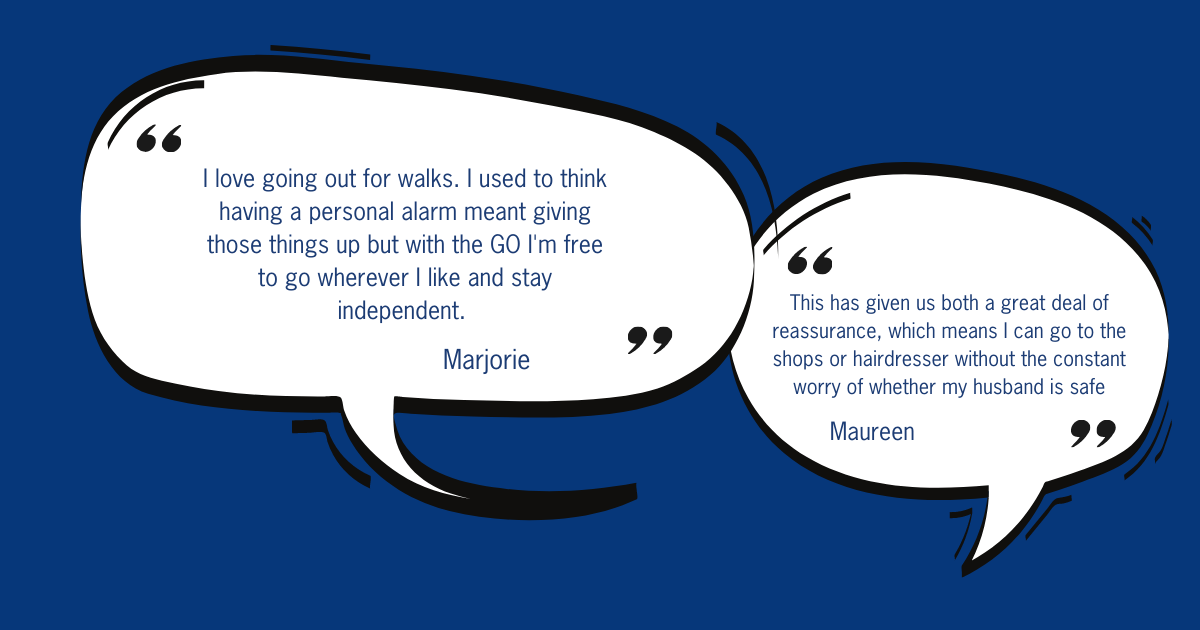Staying Safe and Maintaining Independence
Whether due to age or a pre-existing health condition, some people can struggle to raise the alert when they need help, such as when they have fallen. The anxiety that this causes can limit activity and have an impact on independence. Telecare, or Technology-Enabled Care (TEC), helps people maintain their independence and most importantly, gain easy access to support in the case of an emergency. Alarm devices such as wearable pendants provide ways of keeping you or your vulnerable family members safe.

Before considering high-tech equipment to prompt, warn or trigger alarms, it is good to consider simple solutions that can remove risk. Some hazards are difficult to anticipate, for example the light bulb blowing when you are walking up the stairs. Others are more apparent, and it is therefore possible to reduce risk or get rid of the hazard completely. Examples may include any of the following:
- Remove loose rugs as these are trip hazards.
- Make sure that stairs and passageways are clear of clutter and that the stair carpet is securely fixed, and isn't worn.
- Make sure lighting is adequate. Fit long-life light bulbs.
- Look at the layout of furniture. You may be able to create a safer space by rearranging or reducing the furniture in a room.
- Use equipment that is designed to provide support, such as grab rails and walking aids, rather than leaning on fixtures such as door handles and towel rails.
- Place electrical items near to power points to avoid trailing wires.
Finding Solutions
Potential solutions to hazards should be explored as early as possible, although this is not always easy if the person does not acknowledge or even realise that he or she is experiencing any difficulties. This is particularly relevant when the person has dementia. Introducing change, whether it is in the way that you do things around the home or through using equipment can in itself pose problems for people who are set in their ways or find it hard to learn new tasks. Changes have to be made at the right time and at the right pace.
Familiarity with an environment contributes towards a person feeling secure and confident. However, over a period of time people often accumulate a lot of clutter than can increase the umber of hazards around the home. By simplifying and organising one's belongings, the home can become a much easier place to live independently.
Some simple tips include:
- Keep regularly used items close to hand and remove items that are no longer used.
- Keep essential things where they are easy to see to act as a visual prompt, for example medication and house keys.
- Have an organised approach to everyday tasks to help solve some of the difficulties of forgetfulness and reduce energy expenditure so that tasks become more manageable.
- Have a daily routine. Doing things in a regular order every day and having set days of the week for less frequent tasks can help memory.
- Have a central point of reference, such as a notice board or whiteboard to put your weekly plan in clear view and where you can post reminders.
- Tick off a check list as you go so that you know what has been done, and family and carers are reassured.
- It can help to do things as you go along, for example keep a ‘running’ shopping list so that as you finish items they are added back to the list.
- Avoid getting overtired. You will not function well both physically and mentally. There may be times in the day when you can manage better, or first thing in the morning, so organise your day in accordance with your energy levels.
Even with these things in place, accidents and incidents can happen. Technology enabled care can bring an amazing sense of security for anyone living independently.
Personal Alarms Include: Intercoms, pendants, pagers, alarms, autodiallers in all shapes and sizes.
What are Autodiallers?
Autodialler Alarms are set with a series of members of family or friends, who will be dialled when the button on the device is pressed. They can be programmed to dial multiple people of the wearer’s choice.
An example of these is the Chiptech EVA, a digital home care device that operates using a SIM card and can connect to a 24hr monitoring centre as well as to your family and friends.

Many of these devices also contain in-built fall detection, meaning that even if the user is unable to press the button on their pendant, it will detect the lack of movement and signal an alarm.
One such device is the Chiptech GO. If the wearer falls and cannot press the button the GO will register the lack of movement. An advanced speakerphone allows the response centre to communicate directly with the wearer through the pendant, as well as notify family and friends.

Memory Aids
Personal alarms are useful for more than just fall detection however. Many pendant alarms can be set to give you an alert at a pre-set time so that when the button is pushed you hear a pre-recorded prompt or instruction. This ensures that important daily needs such as food and medication aren’t forgotten. They can also be used to detect abnormal movement such as seizure activity in those with epilepsy.
With Living Made Easy you will find a wide range of Alerts, Alarms and Monitoring Systems under the following categories.
- Household alerts and alarms
- Personal health alerts and alarms
- Movement alarms and monitors
- Autodiallers
- Alarm buttons, pendants and pagers
- Control boxes and monitoring systems
Within these categories you will find helpful advice and information in our Guide To Choosing a Product section, or access AskSARA and select the area of daily life you are struggling with. Select your topic and answer a series of questions to receive a personalised report with links to categories of products that can help you continue to do the things that you want to do.
Thank You For Reading

This article was sponsored by Manage At Home - Your Online Medequip Retail Store.
You can find more support on alerts, alarms and monitoring systems through our category pages above with our Guide to Choosing a Product.
You can find the Chiptech GO here.
You can find the Chiptech EVA here.
We trust that you have found this spotlight on alerts, alarms and monitoring systems useful. Please do share it if you know someone who might find this information and the products helpful. Our target is to reach 5 million individuals by 2022 so please do help us to spread the word socially. You can copy and paste the link to this article in your social channel or email it to a friend you think might find it useful.
If you would like more information on any of the products highlighted, just click on the bold text or the image captions or browse through our product categories at your leisure.
Share your thoughts with like minded people on our forum you'reable. This is our forum for disabled people, by disabled people.
You can also use AskSARA for more specific help and advice.
Call our helpline on 0300 999 0004 or email us at info@dlf.org.uk
If you can support our work now, or in the future please consider making a donation.